- Home
- Craig Lancaster
The Fallow Season of Hugo Hunter Page 14
The Fallow Season of Hugo Hunter Read online
Page 14
The Diploma sat in his chair and leaned way back, like Ali on the ropes against Foreman in Zaire, his undergrad and graduate sheepskins framing his head and supplying his nickname. The Drone sat in the chair next to mine, an uncomfortable proximity.
“We’ve had to mitigate a lot of damage from your column,” Pennington said.
In the queasy car ride to the office, the topic of the talk had seemed bluntly obvious, so I gave myself no credit for insight. I’d used my driving time to imagine the Diploma’s openers and what my responses might be, and this one, it turned out, called for mockery.
“It’s unusual to hear the truth equated to damage,” I said.
“Oh, spare me,” the Diploma said, only his even delivery didn’t betray the slightest bit of irritation, which was too bad. “There’s a way to deliver the truth, as you call it, without being offensive, and without calling one of the most prominent people in town names—”
“Prominent?”
“—and a major advertiser, to boot.”
I started in again. “Ah, yes, advertiser. Now—”
“That column was not to the standard we expect,” Lindell said, and I swear to God, I wanted to lean over and puke on his shoes. I didn’t like Pennington, but I respected him. I respected his intellect and, usually, his manner, even if his sensibilities sat in direct opposition to mine. But Lindell? The worst copy editor I’ve ever seen—certainly the worst on the Herald-Gleaner desk—had risen to the number-two newsroom job mostly because nobody else wanted it, or wanted to carry water for the Diploma. Let me put it this way: Gene Trimear had more managerial bona fides in his short, fat, nicotine-tinged fingers than Mike Lindell had in his entire soulless body.
I scrambled to get my footing. “OK, Bill, look: I didn’t call anybody any names.”
The Diploma stared back at me, incredulous. “A dummy and his dad? I’d say your lack of objectivity about the Schronerts shines through.”
“That was the headline,” I protested, and immediately I wished I’d seized on the Diploma’s incantation of “objectivity,” which shouldn’t be a factor, as opinions are all about subjectivity. “I didn’t write that. Talk to Trimear.”
Lindell again: “We have.”
“Well, OK,” I said.
The Diploma leaned forward, his hands on his desk. “Look, Mark, we’re going to cut to the chase here, as it’s already been decided. This is a serious incident, but you’ve been a good employee for a lot of years—”
“Meaning you can’t find the juice to fire me,” I said.
“If I were you, I wouldn’t be too sure about my juice, as you put it. As I was saying, you’ve been a good employee, which means I hope this episode is an outlier. We’ve managed to set things right with Mr. Schronert, the column has been expunged both online and in our in-house library, and we’ll be sitting you down without pay for five days. At the end of that time, you can report back to work.”
He stopped there, looking at me, trying to suss out my reaction. I sensed there was more he wished to say, and I wanted him to just get on with it.
“OK,” I said.
“OK,” he said. “When you come back, there will be no more columns, at least not for a while. You can still cover regular sports news, but no more in-print opinions until I’m certain you’re ready. That’s up to me.”
“The buck stops with you,” I said.
“That’s right.”
“Starting now.”
I fought with myself not to smile, as I surely wanted to at my tweaking of authority, like a good journalist. Instead, my face heated up as I watched the Diploma choke down my last flinging bit of insolence.
“You may start your five days away now,” he said.
“Let me ask you something,” I said. “We have editors here, right? Gene could have stopped this column. Hell, you could have, too.”
“Gene’s been disciplined. That’s between us and him. And we will be reassessing our protocols for columns from now on. Thank you for pointing that out.”
Lindell saw another opening to toss in a useless remark. “That’s it, Mark,” he said.
I got up and surprised Pennington by offering a handshake. He took my hand, a good, solid grip, and gave it two quick shakes and then let go. Lindell looked at me as if he wanted one, too, but I wasn’t inclined to oblige. If my time was now my own, I figured I’d spend it sidled up to one of Frank Feeney’s beer mugs.
Excerpt from Hugo Hunter: My Good Life and Bad Times
Frank Feeney is the father figure I never had, a truth that’s made difficult by the fact that we aren’t talking anymore.
From the time I was eleven years old, Frank’s word was the law. He trained me, he watched over me, he led me to opportunities that would have never come my way without his presence in my life. He was a moral compass, a trusted friend, a rescuer.
I will love him forever.
And yet, there have been betrayals. Mine against him. His against me. One of the things you learn to do in recovery is make amends, to the extent you can, with those who have suffered from your addiction.
What I owe Frank remains undone. What he owes me remains undone as well.
It’s the worst kind of stalemate.
28
I shuffled into Feeney’s and found a seat at the bar. I had plenty to choose from. The lunch crowd had come and gone, leaving Frank alone in the place.
“Where’s your court jester?” I asked him as I settled into my seat.
“Slumpbuster?” Frank said.
“Sure.”
I watched him draw the beer, the glass tilted just so to form a right-sized head. When he served it, I thanked him and then gave him the look I’d perfected for reluctant sources. A gentle come on now, I asked you a question.
“Ah, hell, you know that kid,” Frank said, sweeping the bar with a rag. “Always something new, always some shiny penny he’s gotta pick up.”
“So he’s gone?”
“Gone from here, yeah. Some girl came in, talking him up. He comes to me the next day and says, ‘Frank, I’m going to be in a play.’ ”
“A play?”
“Yeah, she’s one of those artsy types or something. You know, with the theater down the street? She gives him this line about how he’d be perfect for this play they’re doing, and so he comes to me and says he’s gotta go to rehearsals at night. And I’m there saying, ‘Look, asshole, if you’re working here, you work here at night.’ And he says, ‘Come on, Frank, I gotta do this.’ And I tell him, ‘No, you gotta choose.’ ”
Frank rubbed his eyes and then laughed. “Well, he chose, I guess.”
It would be a lie to say I was surprised. Oh, the circumstance was a little jarring. I don’t think anyone who knew Hugo would think of him as a thespian. But that he’d up and quit a seemingly good situation—well, that was easy to swallow. It followed a pattern that had been well established since the end of his prizefighting days. Before working at the bar, he had jobs driving a delivery truck for an industrial laundry, putting up sheetrock, organizing the stock at a plumbing supply house, and sweeping the floors at Billings West High School. The operative word, in every case, was had.
“Well, he made a liar of me,” I said.
“How so?”
“I talked him up in the paper yesterday. Said he was doing an honorable thing here.”
“Yeah, I saw that,” Frank said. “Thanks for the extra business. You ripped that guy pretty good.”
“They sat me down, Frank. At the paper. Suspended me.”
“For that?”
“Yeah.”
Frank took my glass and topped it off, then set it before me.
“You know,” he said, “I don’t think I want to live in a world where you can’t kick the ass of someone who deserves it.”
Frank wasn’t the person an
griest with Hugo. His niece, Amber, had become smitten during Hugo’s brief employment, against Frank’s initial advice that she maintain some distance from him.
“The thing was,” Frank said, “I was worried about something worse than this—I don’t know what, exactly, but we’ve been around the block with Hugo a time or two, you know? But I gotta admit, he treated her well, and he was good to Jackson.”
“Jackson?”
“Her little boy.”
The night Hugo told Frank he was leaving, Amber apparently let him have it, both barrels. Told him he wasn’t reliable, that she’d made a mistake letting her son grow fond of him, that he’d die alone. Frank’s relaying of that last bit made me cringe. That’s a tough pronouncement to put on anybody. Before Lainie came along, there were many nights I considered that my own probable fate.
“Hugo’s going, ‘Baby, baby, baby, it’s just a play,’ ” Frank said. “And she’s going, ‘You don’t get it.’ She’s right. He don’t.”
“What about this girl, the one who pulled him into the play?” I asked.
“Hugo swears there’s nothing going on.”
“Amber believe that?”
Frank snorted. “What do you think?”
I’ll tell you what I thought. I thought that I could have stayed there all day and into the night, slowly putting away Frank Feeney’s brew and my angst. I also thought, rightly, that Hugo wouldn’t be the only lonely man in Billings if I didn’t get off my ass and go tell Lainie what had happened at the Herald-Gleaner.
“Well, I guess I’ll go figure out what to do with myself for a week,” I told Frank. “Might be spending more time down here with you.”
“You’re always welcome,” he said. “You know that.”
I tried to pay the bill, but Frank would have none of it. “I figure you made me thirty times this just in referrals,” he said. “Sorry about what happened.”
I gave a sly salute and headed for the door. Before I hit the street, I turned back.
“What’s the name of this play?”
Frank snorted again. “You’re not gonna believe it,” he said.
“Try me.”
“Requiem for a Heavyweight.”
29
I went down to the South Side to see Hugo. I’d neglected him for a few weeks anyway, but more than that, I didn’t like taking any bit of news from Frank as gospel, at least where Hugo was concerned. It’s an old reporter thing, to corroborate everything. I knew that all of us tended to cycle our experiences with Hugo through our own filters. Frank’s were predisposed to disappointment. Mine were, too, but I told myself that I needed to be open to hearing Hugo’s side of things.
A few years of neglect had done a number on Aurelia’s house. Blue paint flecked away on the eaves above the door, and I remembered how Hugo had come home from Mississippi after losing to Coconut Olson, long after Frank had bailed out and Squeaky had been sent to the sidelines. It was a nothing fight against a young fighter, the kind of fighter Hugo had once been, and it came out the way things had been ordained. Olson got a victory that looked good on paper, and Hugo came home a busted, tired boxer and paid off his grandma’s funeral bills.
Once he got back, he had climbed up to that bedroom and stayed for weeks. I’d gone to see him a few times, but he’d never come out to stay. He’d come down and he’d chat for a bit, and then he’d be gone again. Before Aurelia died, she had been on him about the house—“Hugo, can you paint it for me?”—and dutiful grandson that he was, he’d told her, yes, he’d do it, just as soon as he had the time. He promised.
Four years had slid off the calendar since she left, and still the promise went unfulfilled. It pissed me the hell off.
I knocked on the front door. Nothing. No stirring from the other side that I could hear.
I went around between the house and the garage, to the little concrete path leading to the backyard. On my tiptoes, I could get my eyes above the fence. Hugo sat in a weather-battered Adirondack chair, his back to me.
“You taking visitors?” I said.
Hugo lurched up out of the chair and turned around. He wore an old robe, molecules of terry cloth holding it together, and a T-shirt and a pair of basketball shorts that were only slightly less vintage.
“Hey, Mark, come on through.” Hugo ambled over and lifted the latch for me. “Sit down, man.” He pulled an old barstool across the patio and set it up opposite his seat. We settled in.
“Damn, you look good, Mark.”
“Thanks. It’s only been a couple of weeks since you’ve seen me. This isn’t old-home week or anything.”
Hugo chuckled and made like he was going to throw a punch at me, our old patter. “I know, I know. But you do look good.”
“Thanks.”
“I read what you wrote about me,” he said.
“Yeah? You kind of made a liar out of me, didn’t you?”
“You talked to Frank, I guess.”
“I did.”
“He’s mad, I guess.”
I took measure of him. He had a bit of a hangdog look, an expectation born of experience that Frank considered him a screwup. He wasn’t far wrong.
“I didn’t get anger from him,” I said. “He just doesn’t get it. It looked like you were doing well there, hanging out, entertaining people. He just—”
“Glory days.”
“Huh?”
“You know,” he said. “Like the Springsteen song. Frank was paying me to relive my glory days for the people who came in.”
“Well, yeah, I guess.”
“It’s a sad song, though. You know? Like there’s nothing better out there.” He looked at me plaintively.
“But Hugo, the song is about a guy who topped out in high school. That’s not you.”
“It’s not? Barcelona happened when I was in high school. That wasn’t the top?”
“It didn’t have to be. That’s the point. You had possibilities. The guy in the song, he’s just some schmuck drinking beer. You had a chance at something greater.”
His face twisted, like he’d been gut-socked. I stopped cold. I was fixing him with an even sadder song.
“Jesus, Hugo, I’m sorry. I mean, there’s truth, and then there’s—”
He waved his hand toward me. “It’s not like I don’t know.”
I scrambled for a different way in with him. “So, a play?”
He leaned forward, his hands flying around as if someone had jump-started him.
“Yeah. I’m Mountain Rivera.”
“I figured.”
“He’s a washed-up old boxer.”
“I know.”
“It’s a great part.”
“Yeah, but you don’t know anything about boxing.”
“Screw you.”
We busted up over that.
Hugo invited me inside for some coffee. I followed him through the back door to the kitchen. The place had served as the center of so many gatherings, it was like walking in on the ghosts of our younger selves. It was almost as if I could see Aurelia there at the stove, her back to us as she worked up a pot of stew or a pan of enchiladas—anything she had, really, to keep us there with Hugo, his family by extension. Frank would be in the far corner, knocking back the beer that Aurelia kept in the house only for him. Squeaky would sit across from Frank, deciphering a crossword and, later, sudoku, that crazy-ass Japanese number game, and he’d scold us once the roaring got too loud, as it always did. And Hugo would be in the middle of it all, at the table or Aurelia’s side, listening to the chatter or helping his grammy. That it was all for him, he knew as deep in his bones as he knew anything.
Now, Hugo shuffled through ahead of me, nimbleness and athletic youth gone and not coming back. The order Aurelia imposed on things was gone, too, replaced by dust and papers and unpaid bills, the detritus of a life
that Hugo claimed to be pulling under control. I didn’t see it.
“Black?” he said.
“You know me better than that.”
He poured the coffee, leaving plenty of room in the cup for doctoring. A three-quarters-empty jug of creamer followed, and I damn near drained it.
“Enjoy your nonjava,” he said, toasting me.
“It’s more a matter of color than taste,” I said.
He leaned against the Formica counter. “You want to know why, don’t you?”
I took in the first lukewarm mouthful and smacked my lips. “I’m always the guy who wants to know why. You know that.”
“It’s my mom.” He cast his eyes down at his bare feet.
“What is?”
“The reason I’m doing the play.”
I set my coffee down. Helene, cut down in her relative youth, was the great loss in his life, more so than even Aurelia, I think. In more than twenty years of knowing Hugo, I’d talked about so many things with him, it would be nigh impossible to catalog them all. But Helene—we only glanced off the topic of her, so profound was his yearning, so overwhelming the memories, so devastating the emptiness. I gave him my full attention and hoped he’d talk.

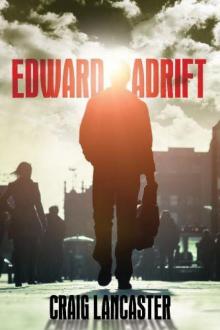 Edward Adrift
Edward Adrift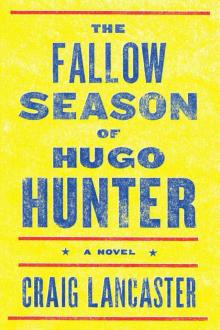 The Fallow Season of Hugo Hunter
The Fallow Season of Hugo Hunter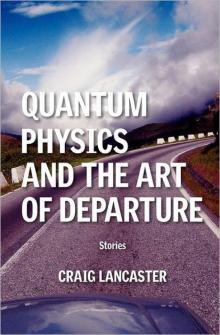 Quantum Physics and the Art of Departure: Short Shories
Quantum Physics and the Art of Departure: Short Shories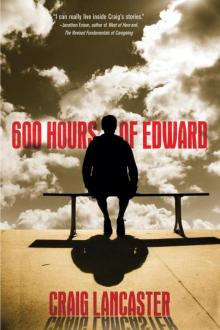 600 Hours of Edward e-1
600 Hours of Edward e-1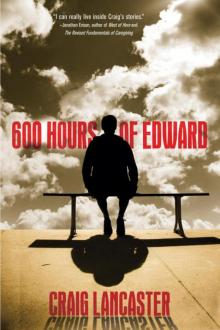 600 Hours of Edward
600 Hours of Edward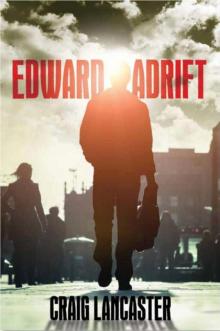 Edward Adrift e-2
Edward Adrift e-2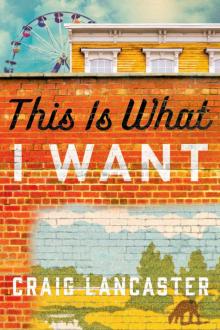 This Is What I Want
This Is What I Want